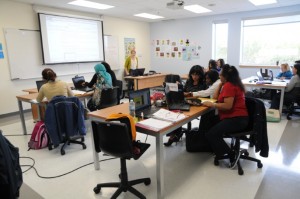Recognizing Work and Life Experience
by Matt Refghi | July 13, 2015
Note: This article is also available in Spanish.
When the Recognition of Acquired Competencies (RAC) team at Champlain College Saint-Lambert was originally founded in 2009, it was quite modest in size: it comprised of one part-time employee, simply. Since then, we’ve grown to have 17 employees/professionals, with 65 content specialists when all services are factored in.
Through our work, we have the pleasure of meeting a multitude of talented individuals, from various fields, where each has their own story, goals, and challenges. What we do is simple: we tell them about a process, one which allows them to get recognition for the life and work experience they’ve accumulated thus far (towards a particular professional field). This is the RAC process, which, in our experience, most people are not aware of. It’s far more common, for example, for people to know about the traditional education model: buy books, attend class, and you’ll build up from knowing nothing about a topic to knowing it all by the end.
The traditional model is great for people that have little to no experience in a field; however, if an individual has a significant amount of experience, there’s another valuable option, RAC. Through the RAC process, a person can simply be evaluated for what they already know, and have the remaining bits filled by condensed, rigorous seminars and work sessions. At the end, regardless of the approach they take, they receive either an Attestation d’études collégiales (AEC), or a Diplôme d’études collégiales (DEC), depending on the service or program they selected. It should be noted that candidates don’t have to complete all competencies within the service or program if they don’t need to – they can just select those they desire (though they won’t receive an AEC or DEC).
As we hinted earlier, when we meet people at job fairs and beyond, they’re often surprised to find out that something like RAC exists. Yet, it’s so logical – if you have a significant amount of skill in a given area, and you can show us what you know – why can’t an educational institution treat that as progress towards a certificate or diploma? It’s an attractive prospect for most, provided they have enough experience to be eligible.
At RAC, we determine eligibility early in the process: a candidate will meet an advisor, and if they seem like a good fit for RAC, they’ll be invited to what we call a validation interview. It’s in this interview that each candidate meets with an experienced professional from the industry, and they are asked questions to challenge their knowledge. By the end, there’s a clear list of what they’re ready to be evaluated for, what they need to review, or are missing altogether.
It’s important to mention: RAC candidate can have holes in their knowledge, as long as they have a significant amount of experience overall. We find many potential candidates tend to under-estimate themselves, yet, in our experience, people generally don’t realize how much they know. Some of our candidates were originally unsure of their knowledge, and yet, they were accepted, and succeeded. This is often because people tend to absorb additional knowledge and skills throughout the course of their professional careers, even if isn’t directly related to their primary role.
And for our candidates, their goals are generally about advancing their careers– RAC is a viable way to progress, in one way or another. While motivations vary from one individual to another, usually, our candidates approach RAC to either:
- improve their employment prospects
- get promoted
- shift into a related field
- AEC – Specialist in Transportation and Logistics
- AEC – Information Technology Client Support
- AEC – Early Childhood Education
- AEC – Special Care Counselling
- AEC – Applied Business Development
- AEC – Cisco Certified Network Associate CCNA
- DEC – Office Management
- DEC – Information Technology Network Management (Coming Fall 2015)
Filed under: Applied Business Development, Cisco (CCNA), Early Childhood Education, Information Technology Client Support, IT Network Management, IT Support, Miscellaneous, Special Care Counselling, Transportation & Logistics
Tags:





